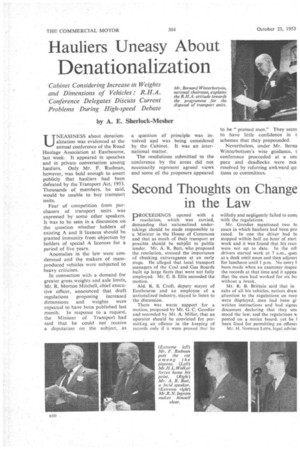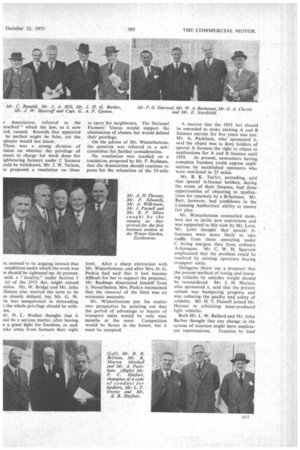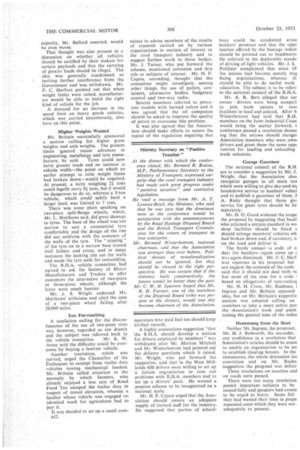Second Thoughts on Change in the Law
Page 44

Page 45

Page 46

If you've noticed an error in this article please click here to report it so we can fix it.
PROCEEDLNGS opened with a resolution, which was carried, demanding that nationalized undertakings should be made responsible to a Minister in the House of Commons and that as much of their transport as possible should be subject to public tender. Mr. A. R. Butt, who proposed the resolution, stressed the importance of checking extravagance at an early stage. He alleged that local transport managers of the Coal and Gas Boards built up large fleets that were not fully employed. Mr. E. B. Ellis seconded the motion.
Ald. R. S. Croft, deputy mayor of Eastbourne and an employee of a nationalized industry, stayed to listen to the discussion.
There was warm support for a motion, proposed by Mr. G. C. Goodier and seconded by Mr. A. Miller, that an operator should be convicted for permitting an offence in the keeping of records only if it were proved that he
wilfully and negligently failed to comi with the regulations.
Mr. Goodier mentioned two tit cases in which hauliers had been pro cuted. In one the driver had bt stopped within half an hour of start work and it was found that his reco were not up to date. In the oti. drivers started work at 7 a.m., quet at a dock until noon and then adjourt for luncheon until 1 p.m. No entry I been made when an examiner inspec the records at that time and it appea that the men had worked for six ho without a break.
Mr. R. B. Brittain said that in cabs of all his vehicles, notices draw attention to the regulations on reco were displayed, men had been gi. written instructions and had signec document declaring that they unc stood the law, and the regulations w posted on a notice board, yet he 1 been fined for permitting an offenc(
Mr. H. Norman Letts, legal advise e Association, referred to the mischief" which the law, as it now )od, caused. Records that appeared be perfect might be false, yet the sployer would not know.
There was a strong division of ,inion on whether the privilege of rmers to charge for work done for ighbouring farmers under C licences ould be withdrawn. Mr. 1, W. Nelson, so proposed a resolution on these seemed to be arguing instead that conditions under which the work was se should be tightened up. At present, said, a "locality," under Section 1 (c) of the 1933 Act, might extend miles. Mr. W. Bridge and Mr. John ,Ilinson also wanted the term to be re closely defined, but Mr. G. W. ,in was unequivocal in demanding t the whole privilege should be withWn.
vIr. H. L. Walker thought that it uld be a serious matter, after having n a great fight for freedom, to seek take away from farmers their right
to carry for neighbours. The National Farmers' Union would support the elimination of abuses, but would defend their privilege.
On the advice of Mr. Winterbottom, the question was referred to a subcommittee for further consideration.
No conclusion was reached on a resolution, proposed by Mr. F. Rudman, that the Association should continue to press for the relaxation of the 25-mile limit. After a sharp altercation with Mr. Winterbottom, and after Mrs. D. G. Parkin had said that it had become difficult for her to support the proposal, Mr. Rudman dissociated himself from it. Nevertheless, Mrs. Parkin maintained that the removal of the limit was an economic necessity.
Mr. Winterbottom put the matter into perspective by pointing out that the period of advantage to buyers of transport units would be only nine months at the most. Competition would be fiercer in the future, but it must be accepted. A motion that the 1933 Act should be amended to make existing A and B licences current for five years was lost. Mr. A. Packham, who sponsored it, said the object was to deny holders of special A licences the right to object to applications for A and B licences until 1959. At present, newcomers having complete freedom could oppose applications by established operators who were restricted to 25 miles.
Mr. B. K. Taylor, seconding, said that special A-licence holders, during the terms of their licences, had three opportunities of objecting to applications for renewals by a B-licensee. Mr. Butt, however, had confidence in the Licensing Authorities' ability to ensure fair play.
Mr. Winterbottom counselled members not to invite new restrictions and was supported in this view by Mr. Letts. Mr. Lens thought that special Alicensees were more likely to take traffic from those operating under C hiring margins than from ordinary A-licensees. Mr. C. W. H. Sparrow emphasized that the problem could be resolved by existing operators buying transport units.
Delegates threw out a proposal that the present method of taxing and licensing vehicles by unladen weight should be reconsidered. Mr. J. H. Haynes, who sponsored it, said that the present system was hampering progress and was reducing the quality and safety of vehicles. Mr. H. T. Pannell joined Mr. Haynes in criticizing mass-produced light vehicles.
Both Mr. L. W. Ballard and Mr. John Barber thought that any change in the system of taxation might have unpleas ant repercussions. Taxation by load capacity, Mr. Ballard asserted, would • be even worse.
That thought was also present in a discussion on whether all vehicles should be certified by their makers for certain payloads and that the carrying of greater loads should be illegal. The • idea was generally condemned as inviting further interference from the Government and was withdrawn. Mr. F. C. Harfoot pointed out that when weight limits were raised, manufacturers would be able to build the right kind of vehicle for the job.
A demand for an increase in the speed limit on heavy goods vehicles, which was carried unanimously, also bore on this point.
Higher Weights Wanted Mr. Brittain successfully sponsored a motion calling for higher gross weights and axle weights. The present limits ignored recent advances in engineering, metallurgy and tyre manu facture, he said. Tyres could now carry greater loads and no increase in vehicle width—the point on which an earlier attempt to raise weight limits had broken down—would be required. At present, a lorry weighing 2i, tons could legally carry 9k tons, but it would be dangerous to do so, whereas a 54on vehicle, which could safely haul a larger load, was limited to / tons.
There was some plain speaking on two-piece split-flange wheels, which, Mr. L. Matthews said, did great damage to tyres. The base of the wheel was too narrow to seat a commercial tyre comfortably and the design of the rim did not conform with the contours of the walls of the tyre. The " nipping " of the tyre on to a narrow base caused wall failure and creep, and in many instances the locking rim cut the walls and made the tyre unfit for remoulding.
The R.H.A. vehicle committee had agreed to ask the Society of Motor Manufacturers and Traders to offer customers the alternative of two-piece or three-piece wheels, although the latter were much heavier.
Mr. J. S. Wright endorsed Mr. Matthews' criticisms and cited the case of a two-piece wheel failing after
20,000 miles.
Too Far-reaching A resolution calling for the discontinuance of the use of two-piece rims was, however, regarded as too drastic and the subject was referred back to the vehicle committee. Mr. R. W. Amey said the difficulty could be overcome by buying a heavier vehicle. Another resolution, which was carried, urged the Chancellor of the Exchequer to exempt from trailer duty vehicles towing mechanical loaders. Mr. Brittain called attention to the anomaly by which farmers, who already enjoyed a low rate of Road Fund Tax escaped the trailer duty in respect of towed elevators, whereas a haulier whose vehicle was engaged on identical work for agriculture had to pay it. It was decided to set up a small cornB12
mittee to advise members of the results of research carried on by various organizations in matters of interest to the road transport industry and to suggest further work to those bodies. Mr. J. Turner, who put forward the scheme, mentioned corrosion and thin oils as subjects of interest. Mr. H. F. Capon, seconding, thought that the committee might investigate, among other things, the use of pallets, containers, alternative bodies, budgetary control and two-way radio.
Several members referred to prevalent trouble with burned valves and it was agreed that the oil companies should he asked to improve the quality of petrol to overcome this problem.
It was also agreed that the Association should make efforts to secure the repeal of the regulation requiring that operators who paid fuel tax should keep oil-fuel records.
A highly contentious suggestion "that the R.H.A. should develop a section for drivers employed by members" was withdrawn after Mr. Morton Mitchell and Mr. Winterbottom had pointed out the delicate questions which it raised, Mr. Wright, who put forward the suggestion, said that in the West Midlands 600 drivers were willing to set up a liaison organization to iron out problems with R.H.A. members and to set up a drivers' pool. He wanted a pension scheme to be inaugurated on a national scale.
Mr. H. F. Capon urged that the Association should ensure an adequate supply of trained staff for the industry. He suggested that parties of school boys could be conducted arout hauliers' premises and that the oppc tunities offered by the haulage indust should be pointed out to headmaste: He referred to the deplorable standa of driving of light vehicles. Mr. J. S. Pollitzer complained that since 19 the unions had become, merely wag fixing organizations, whereas th should be able to do useful work education. The subject is to be referr to the national council of the R.H.A.
Mr. A. R. Butt alleged that sor owner drivers were being compel to join trade unions to secu facilities to load and unload. After lv Winterbottom had said that R.H. members on the Joint Industrial Coun would bring the matter forward, t conference passed a resolution deman ing that the unions should recogni Association members who were owni drivers and grant them the same Opp( trinities for loading and unloading trade unionists.
Garage Gazetteer
The national council of the R.H. are to consider a suggestion by Mr. J. Wright that the Association shot recognize garages in all main to which were willing to give day-and-nii breakdown service to hauliers' vehicl and to publish a gazetteer of them. 1$ A. Rutty thought that those givi service for giant tyres should be list separately.
Mr. D. 0. Good widened the scope the proposal by suggesting that hauli who attained a certain standard in wo shop facilities should be liSted a should salvage members' vehicles wh had broken down and, if necessary, It on the load and deliver it.
• The hardy annual—a code of ci duct for hauliers—again came up e was again dismissed. Mr. F. C. Hatt was vigorous in his proposal but not suggest the contents of the code. said that it should not deal with ra but most of his case for a code • based on allegations of rate-cuttinE Mr. H. H. Crow, Mr. Rudman, I Ingram and Mr. Brittain opposed idea, but on Mr. Brittain's suggestio motion was adopted calling on members to take a more active part the -Association's work and assist raising the general tone of the indus
Hamstrung from the Start
Neither Mr. Ingram, the proposer, Mr. H. J. Bedworth, the seconder, . any confidence in a resolution that Association's articles should be amen to enable an organization to be set to establish clearing houses. In the cumstances, the whole discussion lac conviction and on Mr. Andra; suggestion the proposal was defern Three resolutions on taxation and on roads were passed.
There were too many resolution: permit important subjects to be cussed fully and speakers had consta to be urged to hurry. Some felt they had wasted their time in prepa reasoned cases which they were not ; adequately to present.




































































































